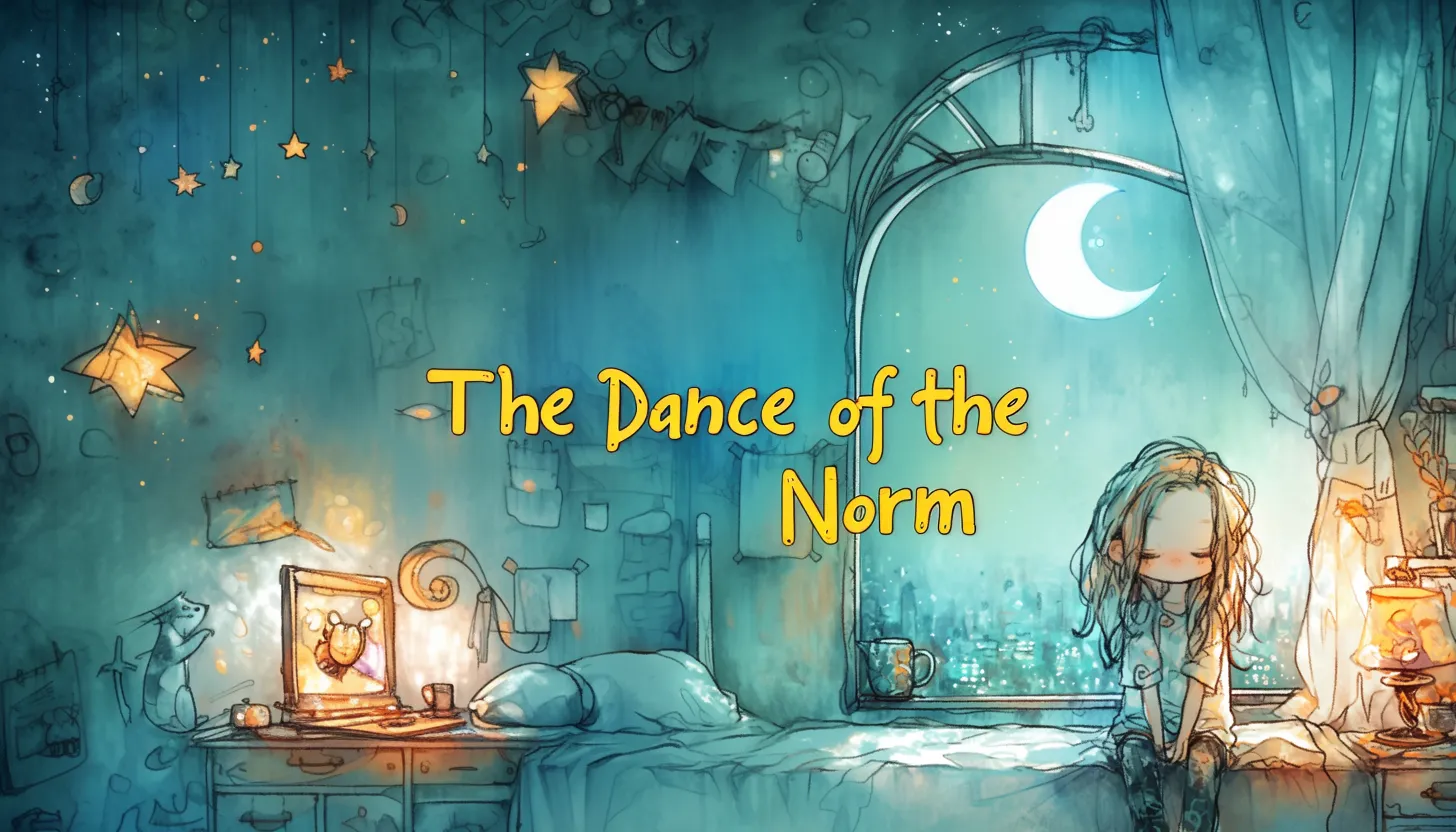Once upon a time, in a kingdom that appeared on no map and where all roads were straight as a freshly carved comb, there lived a girl named Lyra. Lyra was a curious-eyed child with hair as light as cotton candy on a sunny day. In this kingdom, everything—from the songs of the birds to the way shoelaces were tied—followed a thick book of Rules. These Rules were revered, polished, and consulted more often than the royal palace mirrors. People lived by those strict lines, believing that each period and comma held the promise of perfect order and a life without surprises.
For Lyra, the Rules were her daily bread. Her parents, who loved her with calm devotion, reminded her every night that obedience was her greatest virtue. “Follow the Rules, Lyra, and your life will flow as smoothly as a river without rocks,” her mother would say. “Stick to what’s written, and harmony will never leave your side,” her father added. So, Lyra grew up surrounded by calendars, manuals, and posters demanding impeccable behavior. For instance, Rule number 23 required everyone to wake up at the sound of the third crow of the mechanical rooster. Rule number 57 stated that breakfast, without exception, must consist of three rectangular slices of toast—no more, no less—accompanied by a cup of warm milk served in a cylindrical glass. Even the grass in the garden had to be trimmed to the exact specifications of Rule number 118.
Lyra accepted these rules without complaint, though sometimes her eyes wandered toward the horizon, wondering why the sky seemed to have no Rules (or at least none visible in the book). Why did the soft clouds drift wherever they pleased without being stopped by a formal regulation? Yet, she never dared to ask. Perhaps, she thought, the clouds did follow invisible Rules, subtle ones, beyond the understanding of ordinary people like her. And with that thought, she felt at peace, with no further questions.
But one day, while Lyra walked along a perfect path bordered by flowers arranged with mathematical precision, something unusual happened. The small mechanical sparrow, responsible for guarding the garden, tripped over a pebble and dropped a metal feather, which clinked as it hit the ground. Lyra stopped to look. According to the Rules, when something fell to the ground, it had to be picked up with the right hand after counting to three. But Lyra, driven by simple curiosity, bent down and picked it up with her left hand, without counting. Immediately, a playful breeze seemed to giggle through the leaves. Nothing exploded, nothing crumbled, and no one ran in alarm. Had the order been broken? Or had the Rule simply not noticed? Lyra looked around and saw that everything was as it had been. This lit a spark inside her: what if the Rules weren’t as rigid as she’d always been told?
That night, Lyra couldn’t sleep well. Her room, spotless and orderly, felt too quiet, too submissive. She looked out the window and saw how the stars twinkled freely, without any manual arranging them. She thought about the next day, about the rectangular slices of toast and the cylindrical glass. What if she cut her toast into triangles? Would something terrible happen—would the sky fall, or the town spin like a runaway top? Or would nothing happen, just as with the metal feather?
The next morning, Lyra decided to conduct a small experiment. She waited for the third crow of the mechanical rooster (Rule number 23 wasn’t so bad—it helped her wake up in time to watch the sunrise), but instead of three rectangular slices of toast, she served herself three triangular ones. With slightly trembling hands, she took a bite in silence. They tasted just as delicious! No more, no less crunchy. When she looked up, she half-expected to see a stern keeper of order watching her, but there was no one. Her father continued reading the Rulebook newspaper, and her mother stirred warm milk with the regulatory spoon. Everything was the same, except Lyra now felt a secret tune playing in her mind, a kind of quiet laughter, as if each bite was a little dance along the edge of the Rules.
Throughout the day, Lyra continued testing the boundaries of the Rules. When she watered the plants at the exact time dictated by Rule number 89, she sang a made-up song instead of the official anthem. The flowers didn’t complain. When she organized her notebooks, instead of arranging them from smallest to largest, she placed them in order of the funniest cover illustrations. Nothing bad happened. With each small, subtle rebellion, the world continued without a hitch. Lyra began to understand: the Rules weren’t what held the world together; they were just a game of expectations, a dance imposed because everyone believed they couldn’t do anything else.
The girl decided to take a small journey through her kingdom, hoping to discover if others also suspected the Rules could bend without breaking. She walked until she reached the Scroll Plaza, where statues of serious-looking sages with stiff beards stood. There, she met a talking cat named Alabaster. The cat sat on a wall, paws crossed, watching the people pass by. “Good day, dear Alabaster,” Lyra greeted him politely. According to Rule number 2, greetings were to be delivered without a smile and in a dry tone, to show seriousness and respect. But Lyra smiled so brightly that her cheeks looked like two rosy apples. “Good day, Lyra!” replied the cat, surprised by the girl’s warmth. “Don’t you know Rule number 2 says you mustn’t smile when greeting?” Lyra nodded mischievously. “I know, but I did it anyway, and look, nothing bad happened—not even your whiskers got bent.” The cat chuckled, and in his laughter was the echo of a forgotten secret.
Lyra realized she wasn’t alone. From that day on, she began to try bolder things. She played with the cushions in her living room, stacking them without following the Rule about decreasing sizes. She sang during tea time, even though making noise was prohibited. She even painted a small picture with irregular shapes, something Rule number 501 strongly discouraged as being too chaotic.
Gradually, other inhabitants of the kingdom began to notice Lyra’s playful defiance. At first, they were frightened. “What if the sky falls if we follow her example?” a cobbler muttered. “What if the crops stop growing because no one obeys the Rules?” a farmer trembled. But soon, they discovered that the sun still rose on time, the birds still sang their metallic chirps, and the plants continued to bloom without demanding permits or receipts. A faint giggle spread through the streets, and slowly, people began allowing themselves small freedoms: a hat tilted to the left instead of the right, a melody whistled during lunch, a loose ribbon in a braid. The kingdom’s rigid inflexibility began transforming into a dance of possibilities.
Not long after, the statues of the sages in Scroll Plaza, which had always remained motionless like the marble they were made of, began to move their fingers slightly. Observant townsfolk noticed that, when no one was looking, the stone beards curled into mischievous loops. With the fresh breeze of freedom, the entire kingdom seemed to breathe easier. The air no longer smelled solely of chalk and rules but also of freshly baked pie and green leaves crunching joyfully under the sun.
Inspired by this new atmosphere, Lyra decided to do something grand to prove that the Rules could be flexible without the world falling apart. She gathered everyone in Scroll Plaza one spring afternoon. With a voice full of excitement, she proposed an unexpected idea: a great dance where, instead of following the Rules of choreography detailing every step and rhythm, everyone would dance to the beat of their own heart.
At first, the idea caused a stir. Dancing without Rules was like painting without colors, some said. Others covered their mouths in horror at the thought of moving without precise instructions. But Lyra encouraged them with a radiant look. “Trust me,” she said, “trust that the world doesn’t depend on these rigid lines. The sky will remain, strong and kind, even if we move our feet outside the book’s rhythm.”
And so, the day of the dance arrived. The plaza filled with people from all corners of the kingdom: cobblers, farmers, curious children, talking cats, humming flowers, and even a low-hanging cloud that decided to take a closer look. At first, everyone stood still, waiting for someone to set an exact rhythm or give a clear command. But then Lyra kicked off her shoes and started to dance. It wasn’t a perfect dance, nor refined, nor by the book; it was a free dance, full of unexpected twirls and clumsy little hops. Seeing her, Alabaster the cat dared to spin on his tail. An elderly woman, cane in hand, swayed her shoulders to the breeze. A balloon seller, who had never bent his knees beyond what the Rules allowed, began bouncing as if his feet had springs.
Soon, the plaza became a kaleidoscope of movement, an explosion of gestures and smiles. The most surprising thing was that the world didn’t break or tear apart. The sun didn’t flee. The mechanical rooster still crowed the next morning, though its song seemed to carry a few new, cheerful notes. The flowers, instead of wilting, glowed with brighter colors. And the statues of the sages, at last, gave up their stony silence and clapped with their marble hands. Some claimed to hear a whisper from the granite: “The dance of the Rule becomes the dance of the soul.”
From that day on, the Rules didn’t vanish entirely. They didn’t need to. They simply stopped being hard, unbreakable chains and became flexible guides, gentle suggestions. People could choose to wake up at the third crow of the rooster, or the second, or even the fourth if they wanted to watch the sunrise a little longer. Toasts could be triangular, rectangular, or shaped like hearts. And no one raised their voice if they saw a mismatched sock, an unevenly trimmed flower, or a child greeting with a broad smile.
Amidst this wonderful transformation, Lyra felt fulfilled. She had discovered that the world was far more colorful when the Rules were as pliable as fresh clay in a potter’s hands. She had learned that staying true to oneself didn’t destroy order but made it more beautiful, more human, more alive. Her kingdom, once so rigid, was now a whirl of possibilities where everyone could choose their own dance step.
And so, Lyra, the girl with curious eyes and a wide smile, taught her people that life is a dance—a dance that can respect the rhythm of the Rules but can also leap above them when the heart desires. And in that leap, in that graceful twirl, lay the true flavor of freedom.




